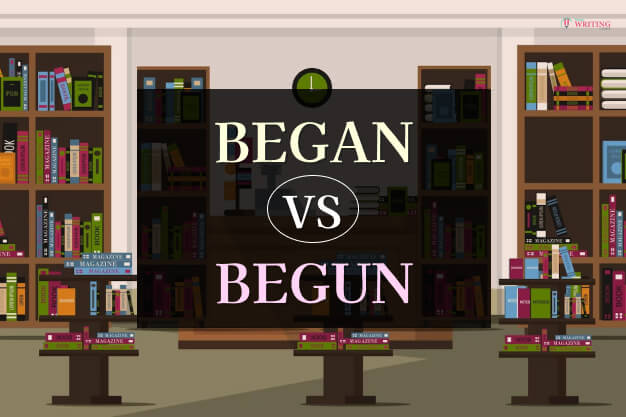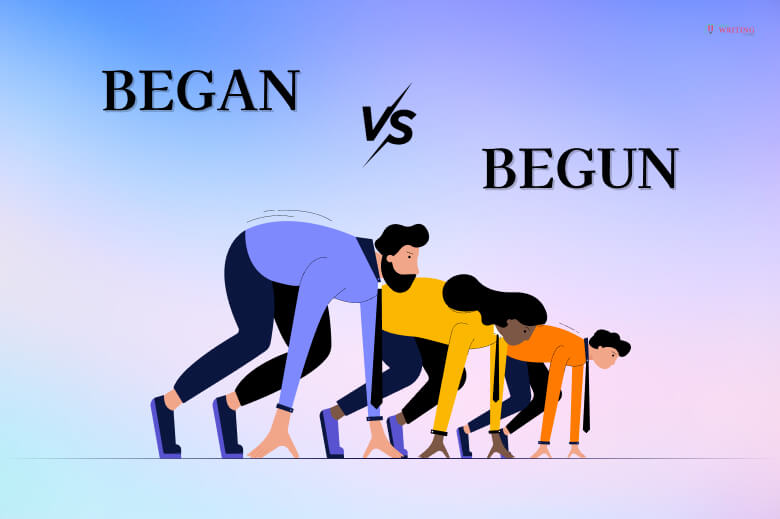It is not always easy to get the tense correctly. We often get confused while using the tense, and not just that, there are different tenses that refer to events and situations that have already occurred. To add to it, there are various irregular verbs that are conjugated in several ways, which takes time to get accustomed to.
One such easy mistake that we make is while using the words begun and began, which are two different forms of a similar verb.
According to the Thesaurus, began is the past tense of begin, and the past participle of begin is begun.
Well, Oxford Learners Dictionary also says the same, that began is the past tense of begin and begun is the past participle form.
From the above-given statements, it can be easily figured out that both are different forms of the same verb begin.
For example, I began the day before yesterday. This is the simple past tense of begin.
Whereas “I had already begun” is the past participle form.
How And When To Use Began In A Sentence?
The verb begin is considered to be irregular because the past and past participle tense does not have the typical ‘d’ or ‘ed’ at the end of the past participle tense. Every verb that does not follow the standard ‘d’ and ‘ed’ format for their past and past participle form is considered to be irregular.
The simple past tense of begin is ‘began,’ which means to start something.
Examples
- You are thirty minutes late to the meeting. We began at 9 o’clock, and you came here at 9:30 AM.
- It began to snow last night, and by the looks of it, it seems that the airport must have closed by now.
- The stadium began cheering and clapping for the best finisher ever, MS Dhoni.
- They began to walk down the alley as the bus broke down.
- They began the trek as soon as the last member of the team arrived.
All About Begun
As we have discussed earlier, the past participle form of begin is begun. In general past particle forms are preceded by auxiliary verbs like has, had and have to make the verb tenses. The phrase we use, ‘it has begun,’ is generally used along with a third-person singular subject. But have begun can be used with any subject, including first-person plural or first-person singular, second-person plural or singular, as well as third-person plural.
Examples
- The event has already begun, and we haven’t even reached the auditorium yet.
- When the first bullet is shot, that means that the games have begun.
- Once the process has begun, there is no turning back.
- By the time she realized she was missing half of her wedding dress, the ceremony had already begun.
- Have you begun your assignment yet?
Then there are proverbs as well, like, “Well begun is half done.”
Like any other past participle, begun is also used in the passive voice.
Examples
- The traditions were begun by the late King George in the 19th Century.
- The loud meowing of the cats was begun by the white shaggy one.
Began vs Begun

Began is generally not used with any kind of helping verb; it is a simple past conjugation. Begun is the past participle of begin. It always needs a helping verb to form a correct sentence.
Began vs begun example
- The movie began thirty minutes ago, and we are still not there yet./The movie had already begun thirty minutes ago, and we have not reached there yet.
- It began to rain./The rain has already begun.
- You began running as soon as you saw the dog./You had begun running as soon as you saw the dog.
- I began dancing out of happiness when I saw the clouds getting darker./I had begun dancing out of my heart’s desire as the clouds started gathering.
- The game of soccer began before we got there./The game of soccer had already begun before we got there.
It is evident from the given examples that whenever we use I, we, she, they, the word began is used in a very simple way, on their own. Unlike the past tense of begin, that is, began, the past participle begun can never be used on its own without the use of an auxiliary verb.
Examples Of Has Began vs Has Begun

Began is used all by itself and does not need any auxiliary verb. But begun does need the help of an auxiliary verb.
- It has begun raining.
- The match has begun with an amazing sixer by none other than the captain of the team.
- She has begun smoking again.
Here Are A Few More Examples Of Has Begun vs Began.
- We began the journey at 9 AM in the morning. /The journey has begun at 9 AM in the morning.
- The program began before everyone arrived./ The program has begun before everyone arrived.
Wrapping up!
Began vs begun can often get confusing, but the simple formulas or the above-given example will help you keep in mind how to use the two forms of the same verb. You might often think if has begun or has began, which is correct. But remember began can be used on its own, and begun needs the support of an auxiliary verb.
Additional Reading:


